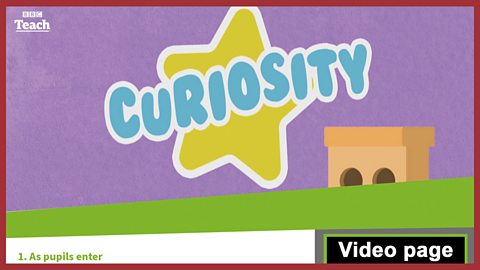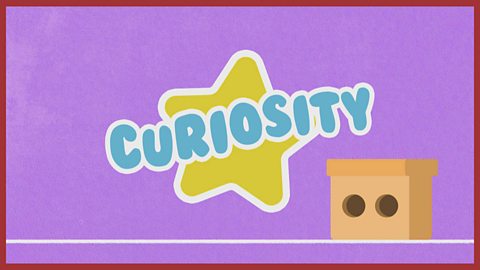In short...
Themes: Fables; curiosity; questioning.
Summary: This assembly, which is suitable for an act of collective worship, focuses on a fable called The Astronomerâs Telescope, which for our retelling is called The Monster on the Moon.
Resources: The and an image to display . You will also need an image or an object that is complicated to look at and not immediately obvious what it is used for (eg an old-fashioned mangle for drying clothes).

The video
GEMMA: Hello, I'm Gemma and this is the amazing story of The Monster on The Moon! It's about an astronomer. Now, an astronomer is someone who is curious about the amazing things in space, like stars and planets, and they work at an observatory like this one.
One night, the astronomer pointed his great big telescope at the moon, because he was curious about what he would see there, and he saw [GASPS] a monster!? Oh my goodness, there's a monster on the moon! It's huge!
Oh, I can't see it very clearly, but it must look something like this. I reckon that monster has to be at least a hundred miles wide! Everyone, look at this.
KIDS: [GASP]
GEMMA: Scientists came from far and wide to look through the telescope and when they saw the big creature with gigantic legs, they all thought the astronomer was right.
BOY: [SCREAMS]
BOY: There's a monster!
GIRL: On the moon!
GEMMA: Then one day, a scientist showed up who was very curious to find out more about the monster on the moon.
SCIENTIST: Ahem, is there really a monster on the moon?
ASTRONOMER: Yes, I saw it, so it must be up there!
SCIENTIST: Well, I can't see anything.
ASTRONOMER: Oh no, you need to look through the telescope.
SCIENTIST: Hmm, I'm very curious about this telescope.
ASTRONOMER: What are you curious about the telescope for?
SCIENTIST: Well, I just want to know more about it. May I have a look?
ASTRONOMER: Okay.
SCIENTIST: Why, thank you.
ASTRONOMER: No, don't look at the telescope, look through the telescope like everyone else. Look at the monster on the moon! That's the amazing bit. Oh, I'll leave you to it.
GEMMA: This scientist was curious about the bottom of the telescope. And curious about all the controls on the telescope, and when the scientist was curious enough to look into the top of the telescope, he found something very interesting.
SCIENTIST: Hey, I found a ladybird, not a monster a hundred miles wide, just a cute little insect.
ASTRONOMER: Oh, how did that get in there? False alarm, there's no monster on the moon, it was just a ladybird. Sorry about that, my mistake. Next time, I'll remember to be even more curious.
GEMMA: Everybody was happy. That curious scientist shows everyone why curiosity is so important. Thank you so much for helping me tell today's treasure story. It's one of Aesop's fables. We'll see you again soon. Bye!
KIDS: Bye!

The story is based on a fable attributed to Aesop called The Astronomerâs Telescope. It helps us to reflect on the value of being curious. In this retelling the astronomer looks through his telescope and sees a monster on the moon. It takes a rather more curious scientist to determine that what the astronomer is seeing is in fact just a ladybird on the lens of the telescope.
Curiosity can help us all to find solutions and to understand how other people think and feel.
Duration: 3' 46".
Final words: 'We'll see you again soon. Bye! Bye!'
Video questions
- What is an astronomer? (Someone who studies things in space - like stars and planets - and they work in an observatory)
- What does the astronomer think he sees? (A monster on the moon)
- Who does the astronomer tell about his discovery? (Other people including scientists)
- What has the astronomer really seen? (A ladybird - on the lens of the telescope)

Key links
Download / print the assembly framework ready for use

Click to display image full size


1. Entry
Play your chosen music as the children enter and display your chosen object.
2. Introduction
Show the children your complex object, or an image of one (eg the mangle). Ask the children if they can think of a good question about the object. Some good examples might be: what is it meant to do? Are there any parts that move and how do they move? Are there any labels or clues about where it was made? Are there any parts which could be handles or used to carry something or hold something?
Briefly explain what the object is if the children haven't already deduced this. Explain that the story that everyone is about to watch is about the importance of curiosity.
3. Play the video
Duration: 3' 46". The final words are: 'We'll see you again soon. Bye! Bye!'
4. Time to talk
You could begin by asking the Video questions above to aid children's recall of the story. Then lead a discussion about curiosity by asking:
- What was different about the last scientist that came to visit? (He was curious about the telescope)
- The astronomer was a bit confused when the scientist started asking questions about the telescope. Curiosity leads us to ask different questions; we might think about something in a different way. Why might it be helpful to be curious about something?
- You could talk to children about inventors who design and create new machines; doctors and scientists who find new ways to treat illness; or scientists who discover new things about the world. Through their curiosity we come to know more about the world / universe.
5. Opportunity to sing
Suggestions from ±«Óătv collections below.
6. Opportunity for reflection
Let's spend a moment thinking about times when we have questionsâŠ
Maybe we have hobbies or interests that we have lots of questions aboutâŠ
Maybe we have lots of ideas and are curious about inventing something newâŠ
Or maybe we have questions about things that other people believeâŠ
Take a moment to think about things you'd like to find out about⊠about what makes you curious⊠and why it's important to find answers to your questionsâŠ
7. Opportunity for prayer
Begin with your usual form of address (âDear Godâ, âLet us prayâ, etc) and:
Thank you for stories about curiosity that can help us to think about the world and other people.
Help us to be grateful when people ask difficult questions, or think about things in new ways.
Thank you that we all grow in knowledge and understanding when people are curious.
Amen.

Suggested songs
Song: 'While we live we learn' (All about our school, no 3. Vocal version)
While we live we learn, (while we live we learn,)
While we learn we grow, (while we learn we grow,)
And the more we grow, (and the more we grow,)
So the more we know, (so the more we know,)
And the more we know, (and the more we know,)
Then the readier we will be
For all life's big adventures
And all life's mysteries.
While we live we learn, (while we live we learn,)
While we learn we grow, (while we learn we grow,)
And the more we grow, (and the more we grow,)
So the more we know, (so the more we know,)
And the more we know, (and the more we know,)
Then the readier we will be
For all life's big adventures
And all life's mysteries.
For all life's big adventures
And all life's mysteries.
Song: 'We will grow' (All about our school, no 10)
(Chorus)
We will grow
And share with each other,
We will show
That we care for one another,
âCos we know
We are sisters and brothers in the eyes of God above.
We are growing together in love.
- Some things grow very quickly,
Sometimes theyâre very slow.
Sometimes you can see What theyâre going to be,
Sometimes you just donât know.
(Chorus)
We will grow
And share with each other,
We will show
That we care for one another,
âCos we know
We are sisters and brothers in the eyes of God above.
We are growing together in love.
- Sometimes it seems like magic
That happens every day.
But itâs all been planned,
Made by Godâs own hand,
âCos creation it works that way.
(Chorus)
We will grow
And share with each other,
We will show
That we care for one another,
âCos we know
We are sisters and brothers in the eyes of God above.
We are growing together in love.
We are growing together in love.
We are growing together in love.
Song: 'Got a bit better' (All about our school, no 11)
Got a bit better at reading,
Got a bit better at sums,
Got a bit better at writing,
Just like all my chums.
Got a bit better at music,
Got a bit better at sport,
Got a bit better at painting,
All the things weâre taught.
Chorus:
Weâre learning to be kind like everybody should,
All of us are trying to be children who are goodâŠoh yes!
Got a bit better at helping,
Got a bit better at care,
Got a bit better at friendship,
Learning how to share.
We will all grow a bit daily,
Canât believe how the time flies,
See the change as we move onward,
When we really try.
Chorus:
Weâre learning to be kind like everybody should
All of us are trying to be children who are goodâŠoh yes!
Oh yes, we are!
